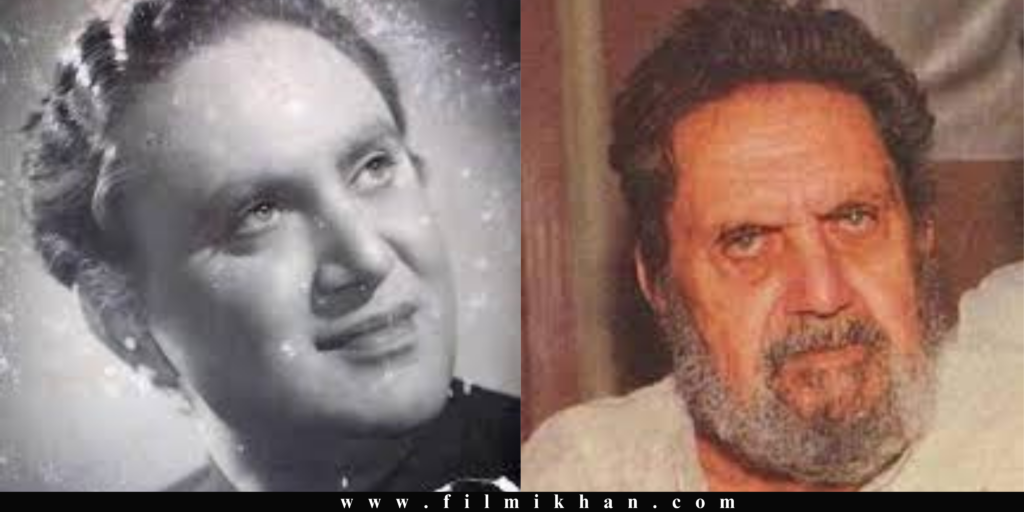
Murad, a luminary of Indian cinema, left an indelible mark on Bollywood’s golden era with his captivating performances and charismatic presence. He was born on 24 September 1911, in Rampur, Uttar Pradesh. Murad embarked on his acting journey with a passion that would define an era.
Murad full name was Hamid Ali Murad, but he was known as his sur name ‘Murad.’ His innate talent and magnetic charm were evident from a young age. He appeared in more than 200 Hindi language films from the early 1940s through to the end of the 1990s, playing character roles of a father, police officer, judge and an emperor.
He made his silver screen debut in 1943 film Najma which was directed by Mehboob Khan. Murad quickly rose to prominence with his versatile portrayals. His ability to seamlessly transition between roles, from the affable sidekick to the formidable antagonist, earned him widespread acclaim and adoration from audiences and critics alike.
The 1950s and 1960s witnessed Murad’s ascent to stardom. He became synonymous with suave sophistication and effortless elegance, captivating audiences with each on-screen appearance. His collaborations with legendary filmmakers such as Mehboob Khan, K. Asif, Bimal Roy, Kamaal Amrohi resulted in cinematic masterpieces that continue to resonate with viewers to this day.
Murad’s filmography is a treasure trove of iconic performances. Whether portraying the dashing romantic lead or the morally upright patriarch, he brought depth and authenticity to every character he inhabited. His memorable roles in films such as Anmol Ghadi (1946), Andaz (1949), Aan (1952) and Amar (1954) cemented his status as a powerhouse performer.
His other notable film roles included Do Bigha Zamin (1953) as a cruel landowner, Devdas (1955) as Devdas’s father, Mughal E Azam (1960) as Raja Maan Singh and the Hollywood film Tarzan Goes to India (1962) as a maharajah. Throughout his career, he was frequently cast as an emperor, judge or police commissioner in over 200 films.
He died in Mumbai on 24 April 1997, at the age of 86.
Murad’s son Raza Murad is also an actor in the Hindi film industry who is known for portray mostly villain roles. Famous actress Zeenat Aman is his niece and his granddaughters are also actresses Sonam and Sanober Kabir.
Beyond his acting prowess, Murad also made significant contributions to the Indian film industry as a mentor and guide to aspiring talents. His dedication to nurturing young actors and fostering creativity left an enduring impact on generations of artists.
Even decades after his passing, Murad’s legacy continues to inspire and resonate with cinephiles worldwide. His timeless performances serve as a benchmark for aspiring actors, while his commitment to the craft remains a guiding light for the industry.
In recognition of his contributions to Indian cinema, Murad received numerous accolades and awards throughout his illustrious career. However, his greatest legacy lies in the hearts of those who continue to cherish his work and celebrate his enduring influence on Bollywood.
Actor Murad’s journey from humble beginnings to cinematic greatness is a testament to the transformative power of art and storytelling. His legacy serves as a beacon of inspiration for future generations of actors and filmmakers, reminding us all of the enduring magic of Indian cinema.
His Notable Films-
Najma (1943), Anmol Ghadi (1946), Neecha Nagar (1946), Anokhi Ada (1948), Andaz (1949), Shair (1949), Dastan (1950), Deedar (1951), Aan (1952), Do Bigha Zamin (1953), Mirza Ghalib (1954), Amar (1954), Devdas (1955), Azaad (1955), Kundan (1955), Yahudi (1958), Mughal-e-Azam (1960), Tarzan Goes to India (1962), Taj Mahal (1963), Fauladi Mukka (1965), Love in Tokyo (1966), Dil Diya Dard Liya (1966), Neel Kamal (1968), Nadir Shah (1968), Jeevan Mrityu (1970).
Caravan (1971), Be-Imaan (1972), Yaadon Ki Baaraat (1973), Saudagar (1973), Imtihan (1974), Manoranjan (1974), Majboor (1974), 5 Rifles (1974), Aap Ki Kasam (1974), Faraar (1975), Sanyasi (1975), Aadalat(1976), Hum Kisi Se Kum Nahin (1977), Mukti (1977), Chakravyuha (1978 film), Ganga Ki Saugandh (1978), Nalayak (1978), Jaani Dushman (1979), Khanjar (1980), Thodisi Bewafaii (1980), Kaalia (1981), Andar Baahar (1984), Dilwaala (1986), Adhikar (1986 film), Tamacha (1988), Shahenshah (1988), Falak (1988 film), Anjaane Rishte (1989), Bhrashtachar (1989), Pyar Ke Naam Qurbaan (1990).